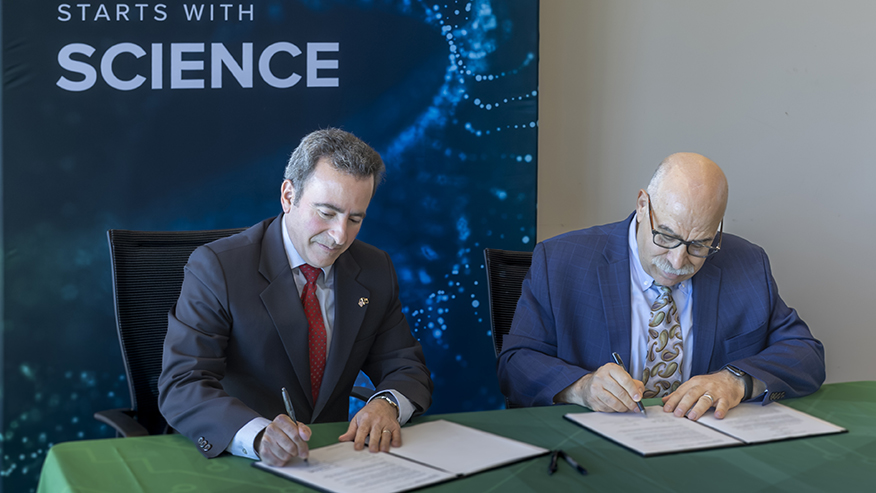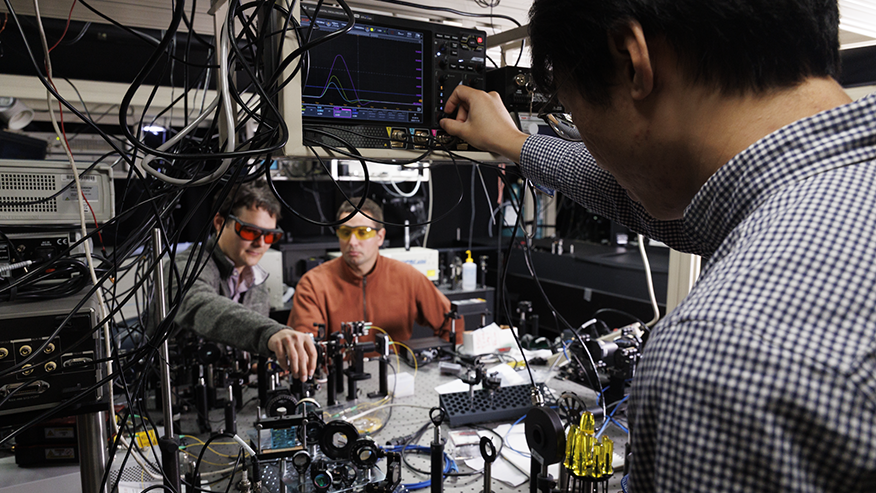Purdue, industry partners convene second CHIPS summit in D.C. with top international and national leaders
High-level panels examine intersection of economics, diplomacy and emerging technologies

Purdue President Mung Chiang onstage with U.S. Sen. Todd Young of Indiana at CHIPS for America: Execute for Global Success. (Purdue University photo/Kelsey Lefever)
WEST LAFAYETTE, Ind. —
More than 330 representatives from industry, government and academia gathered in person and online Wednesday (April 17) in Washington, D.C., as Purdue University and an alliance of industry partners hosted the daylong CHIPS for America: Execute for Global Success summit at the Russell Senate Office Building.
The summit, a collaborative event held by SEMI, Semiconductor Industry Association, Semiconductor Research Corp., Global Semiconductor Alliance and Purdue, attracted a dynamic coalition of global allies as well as industry and academic stakeholders to examine wide-ranging solutions at scale to address the future of U.S. innovation in microelectronics and the semiconductor workforce.
ADDITIONAL INFORMATION
- Purdue, SIA, SEMI, SRC and GSA convene international CHIPS summit to focus on U.S. competitiveness in semiconductor R&D and workforce in a global context
- SK hynix announces semiconductor advanced packaging investment in Purdue Research Park
- A strategic partnership with Dassault Systèmes to improve, accelerate and transform semiconductor workforce development
- European technology leader imec opens innovation hub at Purdue
Now in its second year in the nation’s capital, the chip-focused conference created an opportunity to discuss research and development collaboration, workforce development opportunities, and supply chain partnerships in the semiconductor ecosystem.
Attendees represented 21 like-minded partners from the Asia-Pacific region, Europe, Central and South America, and industry, academic and government organizations from 26 states and Washington, D.C.
Ambassadors and other high-ranking government officials from India, Japan and Taiwan addressed the summit as part of three discussion panels.
Representatives from Belgium, Costa Rica, the Dominican Republic, France, Germany, the Netherlands, Panama, Peru, Romania, South Korea, Singapore and the United Kingdom participated in the conference.

“Along with the co-organizing industry groups, Purdue is excited to convene again the annual CHIPS Summit at the Senate Building in Washington, D.C. This public university and our partners, growing in number and in magnitude, continue to lead this critical foundation for national, economic and job security in America,” Purdue President Mung Chiang said. “Over the past year, we signed partnership agreements with Japan at G7, with India Semiconductor Mission, with imec R&D center at Purdue, and just this month we welcomed SK hynix’s announcement of a $3.9 billion AI memory chip fab at Purdue Research Park. Timing is perfect for today’s theme as we discuss how to identify floors of self-sufficiency and winning spots in the overall supply chain among these partners.”
The summit came just two weeks after South Korea-based memory chipmaker SK hynix Inc. announced plans to invest nearly $4 billion to construct an advanced packaging fabrication and R&D facility for AI products in the Purdue Research Park.
The facility will mass-produce next-generation high-bandwidth memory, or HBM, chips, the critical component of graphic processing units that train AI systems such as ChatGPT.

SK hynix Inc. CEO Kwak Noh-Jung delivered a keynote address and recognized the importance of international collaboration, especially with the U.S., to enhance the semiconductor industry’s resilience, foster innovation and advance supply chain sustainability.
“We are excited to build a state-of-the-art advanced packaging facility in Indiana,” SK hynix CEO Kwak Noh-Jung said in a news release. “We believe this project will lay the foundation for a new Silicon Heartland, a semiconductor ecosystem centered in the Midwest Triangle. This facility will create local, high-paying jobs and produce AI memory chips with unmatched capabilities so that America can onshore more of its critical chip supply chain.”
The top science and technology policy advisor to the White House addressed attendees. Arati Prabhakar, who was on Purdue’s campus for the SK hynix announcement earlier this month, shared how national security is contingent upon the ability of the U.S. to restore domestic semiconductor manufacturing in the U.S. and with near-shore partners.
“This is what happens when we decide to get serious here in America. When that happens and we build in America, we strengthen our supply chain of chips. We strengthen our national security; we strengthen global stability and create good jobs that support families, the kinds of jobs that change people’s lives,” said Prabhakar, President Biden’s chief science and technology advisor and director of the White House Office of Science and Technology Policy.
Chiang led a fireside chat with U.S. Sen. Todd Young of Indiana, who was a co-author of the Creating Helpful Incentives to Produce Semiconductors for America Act, or the CHIPS and Science Act of 2022. Young said legislation alone will not bolster the semiconductor industry for the U.S.
“For the U.S. and our allies and trusted partners, it’s essential that we take some risk out of our supply chains,” Young said. “A modern economy simply cannot run unless we have access to a sufficient supply of chips, and that includes your leading-edge chips that go into our weapons platforms, but it also includes commoditized chips that go into auto assembly and other consumer products.”
Among the other speakers who addressed the summit:
- Ajay Kumar, minister (commerce), Embassy of India in the U.S.
- Alexander Tah-Ray Yui, representative to the U.S., Taipei Economic and Cultural Representative Office
- Hideaki Fujisawa, economic minister, Embassy of Japan in the U.S.
- The Honorable Ramin Toloui, assistant secretary for the Bureau of Economic and Business Affairs, U.S. Department of State
- Richard-Duane Chambers, director of policy and integration, CHIPS R&D Office
- Fran Dillard, chief diversity and inclusion officer, Micron
- Raj Jammy, president, U.S. operations, imec
- Ajit Manocha, president and CEO, SEMI
- Susan Margulies, U.S. National Science Foundation, Directorate for Engineering
- John Neuffer, president and CEO, Semiconductor Industry Association
- Huey-Jen Jenny Su, former president, Distinguished Professor of National Cheng Kung University, and chairman of NCKU Research and Development Foundation, Taiwan
- Todd Younkin, president and CEO, Semiconductor Research Corp.

During the inaugural national chip summit in 2023, the focus was on developing solutions at scale to address the future of U.S. innovation in microelectronics and the semiconductor workforce.
The 2024 summit built upon that success and further explored the need to expand the collaborative network that will define the future of semiconductors, nanoelectronics and digital technologies research and development globally.
“We’re honored to convene such a high-level set of academic, government and industry partners during this transformative period,” said Mark Lundstrom, Purdue’s chief semiconductor officer. “The conversations held here revealed a common bond — that collaboration is key and will be integral to how we reengineer how we work across multiple sectors.”
Vijay Raghunathan, Purdue’s vice president for global partnerships and programs, co-director of the university’s Semiconductor Degrees Program, and professor in the Elmore Family School of Electrical and Computer Engineering, echoed Lundstrom.
“This summit, aptly named for its focus on Catalyzing Highly Impactful Partnerships in Semiconductors (CHIPS), exemplifies Purdue’s commitment to excellence across semiconductor research, innovation, technological advancement and workforce development,” Raghunathan said. “This event not only underscores our role as a crucial facilitator of strategic dialogue but also showcases our leadership in fostering coordinated semiconductor partnerships between the U.S. and our like-minded global allies.”
Purdue’s growing semiconductor innovation ecosystem is one of four key pillars of Purdue Computes, a comprehensive initiative that also includes positioning the Department of Computer Science as a top 10 national program, becoming a leader in the field of physical artificial intelligence, and advancing quantum science and engineering to create future technologies that enable unparalleled excellence at scale.
About Purdue University
Purdue University is a public research institution demonstrating excellence at scale. Ranked among top 10 public universities and with two colleges in the top four in the United States, Purdue discovers and disseminates knowledge with a quality and at a scale second to none. More than 105,000 students study at Purdue across modalities and locations, including nearly 50,000 in person on the West Lafayette campus. Committed to affordability and accessibility, Purdue’s main campus has frozen tuition 13 years in a row. See how Purdue never stops in the persistent pursuit of the next giant leap — including its first comprehensive urban campus in Indianapolis, the new Mitchell E. Daniels, Jr. School of Business, and Purdue Computes — at https://www.purdue.edu/president/strategic-initiatives.
Writer/Media contact: Wes Mills, wemills@purdue.edu
Sources: Mark Lundstrom, Vijay Raghunathan



